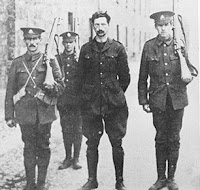
Roma Are Scapegoats During Downturn
Marina Litvinsky
WASHINGTON Apr 8 (IPS) - On International Roma Day Wednesday
human rights groups voiced their concern for the discrimination
and violence against Roma in European countries.
Held on Apr. 8 every year since 1990 International Roma Day
draws attention to discrimination directed at Roma and gypsy
communities globally according to Amnesty International (AI).
Roma are stigmatised as criminals based on the actions of a
few according to Paul Legendre director of the fighting
discrimination program at Human Rights First (HRF). Roma are
often viewed as a scapegoat for broader societal ills often
characterised as outsiders who are less than citizens and are
unwanted in their respective communities he explained.
The present economic crisis has garnered increasing resentment
and violence against Roma as some politicians and extremist
groups blame them for taking away jobs.
HRF’s Hate Crime Survey: Violence Against Roma documents
violence and other forms of intolerance against Roma in eleven
countries during 2007 and 2008. The most widely reported
incidents occurred in Italy where efforts to vilify Roma
involved high-ranking government officials.
The report notes that Roma like members of other visible
minorities routinely suffer assaults in city streets and other
public places as they travel to and from homes workplaces and
markets. In a number of serious cases of violence against Roma
attackers have also sought out whole families in their homes or
whole communities.
The scope of discrimination is often difficult to assess as
governments don’t generally report on violence against Roma
said Legendre.
Roma are not only ill treated at the hands of private citizens.
The report found that police and local public authorities are
sometimes complicit in driving Roma from their homes and seeking
their relocation to other towns or cities.
According to the HRF report in Italy violence was triggered
by the heinous 2007 murder of Giovanna Reggiani a naval
captain’s wife which was attributed to a Romanian immigrant of
Roma origin. The government responded with roundups of Romanian
immigrants and summary expulsions of some two hundred mostly
Roma disregarding E.U. immigration rules.
AI reports that several EU governments plan to forcibly return
Roma to Kosovo where they face severe discrimination. Forcible
returns are expected from Switzerland with whom an agreement
was concluded in February 2009 France and most of the
Scandinavian countries.
In many areas of Europe Roma are confined to segregated camps
or ghettos are denied access to basic education and prospects
for formal employment and may even be refused recognition as
citizens in their own countries.
According to AI discrimination against Roma continues in the
Czech Republic. An anti-Roma march by far-right protesters
through the Romani community in Prerov descended into violence
on Saturday when demonstrators clashed with
counter-demonstrators.
AI’s also states that in Slovakia huge numbers of Romani
children are inappropriately placed in special schools for
children with mental disabilities where they receive a
substandard education and have very limited opportunities for
employment or further education. Independent studies suggest
that as many as 80 percent of children placed in special schools
in Slovakia are Roma.
In Kosovo over 200 families have lived since 1999 in camps
sited on wasteland contaminated by lead. Despite reports in
2001 by the World Health Organisation and others that the degree
of lead contamination in the blood of both children and adults
is one of the highest in the world the Roma remain in these
camps.
Since 2007 the Italian authorities have increasingly adopted
security measures which appear to be discriminatory
affecting disproportionately the Roma and Sinti minority. The
mayors of Rome and Milan signed Security Pacts in May 2007
that envisaged the forced eviction of up to 10000 Romani
people. The clearance and destruction of Roma settlements
without prior notice compensation or provision of alternative
housing was reported throughout the year according to HRF’s
report.
The human rights agencies European Union Agency for Fundamental
Rights (FRA) the Council of Europe Commissioner for Human
Rights the Organisation for Security and Cooperation in Europe
(OSCE) Office for Democratic Institutions and Human Rights
(ODIHR) and the OSCE High Commissioner on National Minorities
(HCNM) issued a joint statement calling on governments
intergovernmental organisations and civil society to step up
their efforts in tackling the human rights violations that the
Roma continue to face in Europe.
As the economic crisis deepens political leaders need to
unequivocally and publicly condemn any form of violence
targeting Roma the agencies said.
International legal and political bodies have taken up and
issued decisions in cases of police violence against Roma and
Sinti.
In spite of the existence of strong anti-discrimination
legislation and policies to promote the inclusion of the Roma
in many countries evidence shows that discrimination against
the Roma persists. In July 2008 the United Nations Human Rights
Committee found in the case of Andreas Kalamiotis v. Greece
that the government of Greece violated several articles of the
International Covenant on Civil and Political Rights. The case
concerned the lack of an effective investigation into
allegations of police brutality against Andreas Kalamiotis a
Roma man on Jun. 14 2001. The Committee ruled that Greece must
provide the victim with an effective remedy and appropriate
reparation as well as take measures to prevent similar
violations in the future.
HRF calls on governments not only fight anti-Roma violence but
to improve the socio-economic status and social inclusion of
Roma across Europe.
(FIN/2009)
































